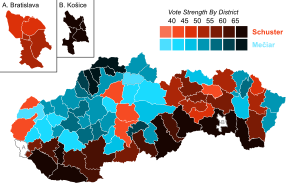| |||||||||||||||||
| Turnout | 73.89% (first round) 75.45% (second round) | ||||||||||||||||
|---|---|---|---|---|---|---|---|---|---|---|---|---|---|---|---|---|---|
| |||||||||||||||||
| |||||||||||||||||
Presidential elections were held in Slovakia on 15 May 1999, with a second round on 29 May. [1] Following a constitutional amendment in 1998 that introduced direct presidential elections for the first time, [2] they resulted in a victory for Rudolf Schuster, who received 57% of the vote in the run-off. [3]



